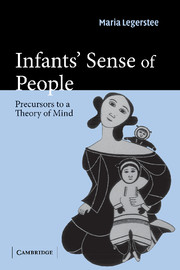Book contents
- Frontmatter
- Contents
- Preface
- 1 Definitions, theories, and plan of the book
- 2 Endogenous and exogenous influences in development
- 3 Animate/inanimate distinction
- 4 Self and consciousness
- 5 Dyadic interactions
- 6 Triadic interactions – Joint engagement in 5 and 7-month-olds
- 7 Social influences on infants' developing sense of people
- 8 Affect attunement and pre-linguistic communication
- 9 The quality of social interaction affects infants' primitive desire reasoning
- 10 Social cognition – affect attunement, imitation, and contingency
- References
- Index
1 - Definitions, theories, and plan of the book
Published online by Cambridge University Press: 22 September 2009
- Frontmatter
- Contents
- Preface
- 1 Definitions, theories, and plan of the book
- 2 Endogenous and exogenous influences in development
- 3 Animate/inanimate distinction
- 4 Self and consciousness
- 5 Dyadic interactions
- 6 Triadic interactions – Joint engagement in 5 and 7-month-olds
- 7 Social influences on infants' developing sense of people
- 8 Affect attunement and pre-linguistic communication
- 9 The quality of social interaction affects infants' primitive desire reasoning
- 10 Social cognition – affect attunement, imitation, and contingency
- References
- Index
Summary
If infant members of a mind-reading species give us the strong feeling that they are doing some kind of mind reading, they probably are.
(Flavell, 1999, p. 32)In a recent chapter, Meltzoff and Brooks (2001) introduced the magical Canadian ice hockey player Wayne Gretzky as the prototype or exemplary human mind reader because he is able to predict accurately where the puck will end up and hence he is already skating toward it before the puck is shot. My golden Labrador retriever Aquarius shows similar traits, however. When I play fetch with him he predicts accurately where an object will land, and hence is running toward the spot as soon as I lift up my arm into a certain direction in an attempt to throw it. Although both Wayne and Aquarius, when in the right situation, can predict accurately what the other will do, their predictions are based on different abilities. Whereas Wayne makes his predictions on where he thinks a teammate might direct the ball (based on mind-reading abilities, a knowledge of the rules of the game, and certain inherited skills from his expert hockey playing father), Aquarius does not make his predictions on mind-reading abilities. Aquarius has an innate ability to catch and retrieve things, and consequently will run toward the spot to which I direct my hand, arm, and ball, or where the ball may land or has landed before. Thus Aquarius relies on my actions, my observable behavior. Aquarius does not read minds.
- Type
- Chapter
- Information
- Infants' Sense of PeoplePrecursors to a Theory of Mind, pp. 1 - 23Publisher: Cambridge University PressPrint publication year: 2005
- 1
- Cited by



